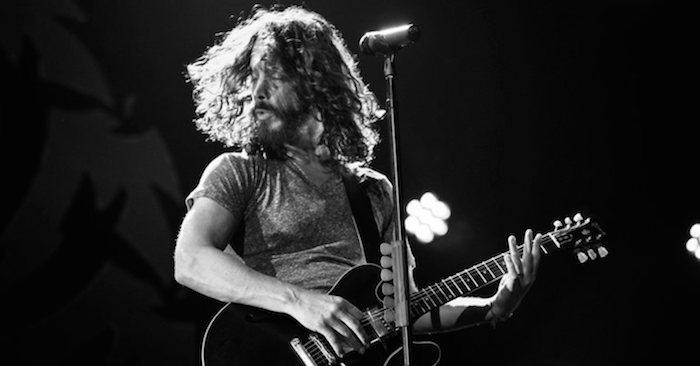Chris Cornell, the powerful, dynamic singer whose band Soundgarden was one of the architects of grunge music, has died at 52.
Mr. Cornell died Wednesday night in Detroit, said his representative, Brian Bumbery, in a statement that called the death “sudden and unexpected” and that said the singer’s family would be “working closely with the medical examiner to determine the cause.”
Dontae Freeman, a spokesman for the Detroit Police Department, said in an interview that at about midnight officers responded at the MGM Grand casino to an apparent suicide of a white man, born July 20, 1964, who was pronounced dead on the scene. He would not confirm the victim’s name; Mr. Cornell’s date of birth is July 20, 1964.
Mr. Freeman said that the victim’s wife had called a family friend to check on the man; the family friend forced his way into the man’s room at the casino and found him unresponsive on the bathroom floor.
The victim was found with a band around his neck, Mr. Freeman said. The police would not confirm that the victim died of a suicide, though the preliminary determination was an “apparent suicide,” Mr. Freeman said. He added that more details would be released in a statement later Thursday.
Mr. Cornell was born in 1964 in Seattle and helped form Soundgarden 20 years later. Sub Pop, then a fledgling record label, released the group’s first single, “Hunted Down,” in 1987, as well as two subsequent EPs. The group’s debut album, “Ultramega OK,” came a year later.
“Badmotorfinger,” released in 1991, benefited from the swell of attention that was beginning to surround the Seattle scene, where Soundgarden, along with Nirvana and Pearl Jam, were playing a high-octane, high-angst brand of rock ’n’ roll. Soundgarden’s musical journeys tended toward the knotty and dark, plunging into off-kilter meters and punctuated by Mr. Cornell’s voice, which could quickly shift from a soulful howl to a gritty growl.
Three of Soundgarden’s studio albums have been certified platinum, including “Superunknown,” from 1994, which featured “Black Hole Sun,” “Fell on Black Days,” “Spoonman” and “My Wave.”
The group — which includes the guitarist Kim Thayil, the bassist Ben Shepherd and the drummer Matt Cameron — disbanded in 1997, but it reunited in 2010 and performed regularly since then. In a review of a 2011 concert at the Prudential Center in Newark, The New York Times chief pop critic Jon Pareles called Soundgarden “one reunited band that can pick up right where it left off.” In 2012, it released “King Animal,” its first album in 16 years, which Mr. Pareles said “sounds like four musicians live in a room, making music that clenches and unclenches like a fist.”
The group played at the Fox Theater in Detroit on Wednesday night, and it had been scheduled to perform in Columbus, Ohio, on Friday at the Rock on the Range festival.
Mr. Cornell appeared to be active on social media in the hours before his death. A post on his Twitter account on Wednesday announced that the group had arrived in Detroit, and a clip of the group’s 2012 release “By Crooked Steps” was posted to his official Facebook page hours before his death.
Mr. Cornell had admitted in interviews to struggling with drug use throughout his life. In a 1994 Rolling Stone article, he described himself as a “daily drug user at 13,” who had quit by the time he turned 14.
After Soundgarden disbanded in 1997, Mr. Cornell returned to heavy drug use, he told The Guardian in a 2009 interview, describing himself as a “pioneer” in the abuse of the opiate OxyContin, and saying that he had gone to rehab.
Mr. Cornell released five solo albums during and after his time with Soundgarden, starting with the 1999 LP “Euphoria Morning.” His 2007 album “Carry On” featured an acoustic cover of Michael Jackson’s “Billie Jean” that served as the inspiration for a well-received version of the song on “American Idol.” He contributed the song “Seasons” to the soundtrack of “Singles,” Cameron Crowe’s love letter to the Seattle music scene, and performed alongside other members of Soundgarden in the film.
In 2001, after Rage Against the Machine’s lead singer, Zack de la Rocha, left the group, Mr. Cornell and members of the band formed Audioslave. The group released three albums before announcing its split in 2007.
In November 2016, Mr. Cornell hit the road for the first time with another supergroup of sorts, Temple of the Dog, which features a blend of members of Soundgarden and Pearl Jam. The group was formed a quarter-century ago as a tribute to Andrew Wood, the lead singer of the Seattle bands Malfunkshun and Mother Love Bone, who died in March 1990 of a heroin overdose.
Speaking to The New York Times, Mr. Cornell said the group had decided to finally bring its songs to life to honor Mr. Wood. “I thought, well, this is one thing that I can do to remind myself and maybe other people of who this guy is and was and keep his story and in a way his life with us,” he said.
Correction: May 18, 2017
An earlier version of this obituary misidentified the source of a tweet honoring Chris Cornell. The posting came from a Rage Against the Machine fan account, not from the band.
– World news via The New York Times.

